Discover the untold story of how three powerful governments mysteriously vanished, leaving behind unanswered questions, shocking truths, and historical lessons still relevant today.
How Three Governments Vanished in just span of 72 hours (3 days)
- Homepage
- Insights
- How three Governments Vanished in just span of 72 hours (3 days)
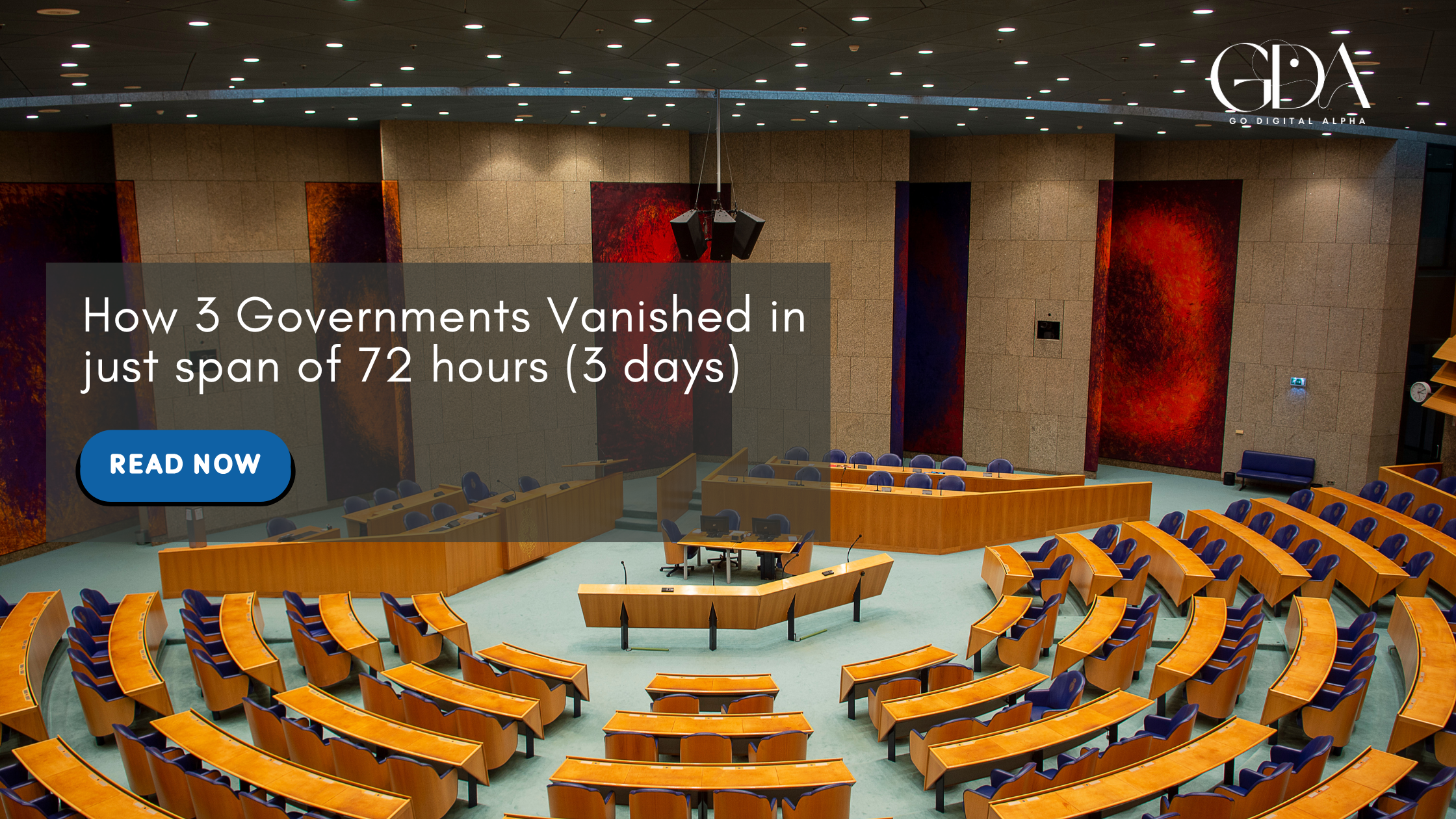
Within 72 hours in September 2025, three governments collapsed across France, Nepal, and Bangladesh, each upheaval triggered by domestic crises and massive protests, representing one of the most dramatic global waves of political change in recent years.
Key Takeaways
France: Collapse Amid Fiscal Turmoil

France’s government which was one of the three govenments vanished, led by Prime Minister François Bayrou, collapsed on September 8, 2025, following a devastating confidence vote in the National Assembly. Lawmakers overwhelmingly rejected Bayrou’s proposal to slash €44 billion ($52 billion) in spending to address France’s ballooning deficit, with 364 votes against and 194 in favor—a crushing defeat in the 577-seat lower house. This marked the fifth prime minister to be ousted in less than two years.
Major stats and fallout:
- Budget Deficit: France faced an urgent need to save at least $51 billion in its 2026 budget.
- Parliamentary Fragmentation: No coalition achieved majority, making governance “close to mundane instability”.
- International Impact: France entered a legislative deadlock amid wars in Ukraine, Gaza, and shifting priorities globally, which led one of the three governments vanish recenlty.
- Immediate Effects: President Emmanuel Macron began the search for his fifth PM in two years as opposition parties united to force a new government after.
Nepal: Gen Z-Led Uprising
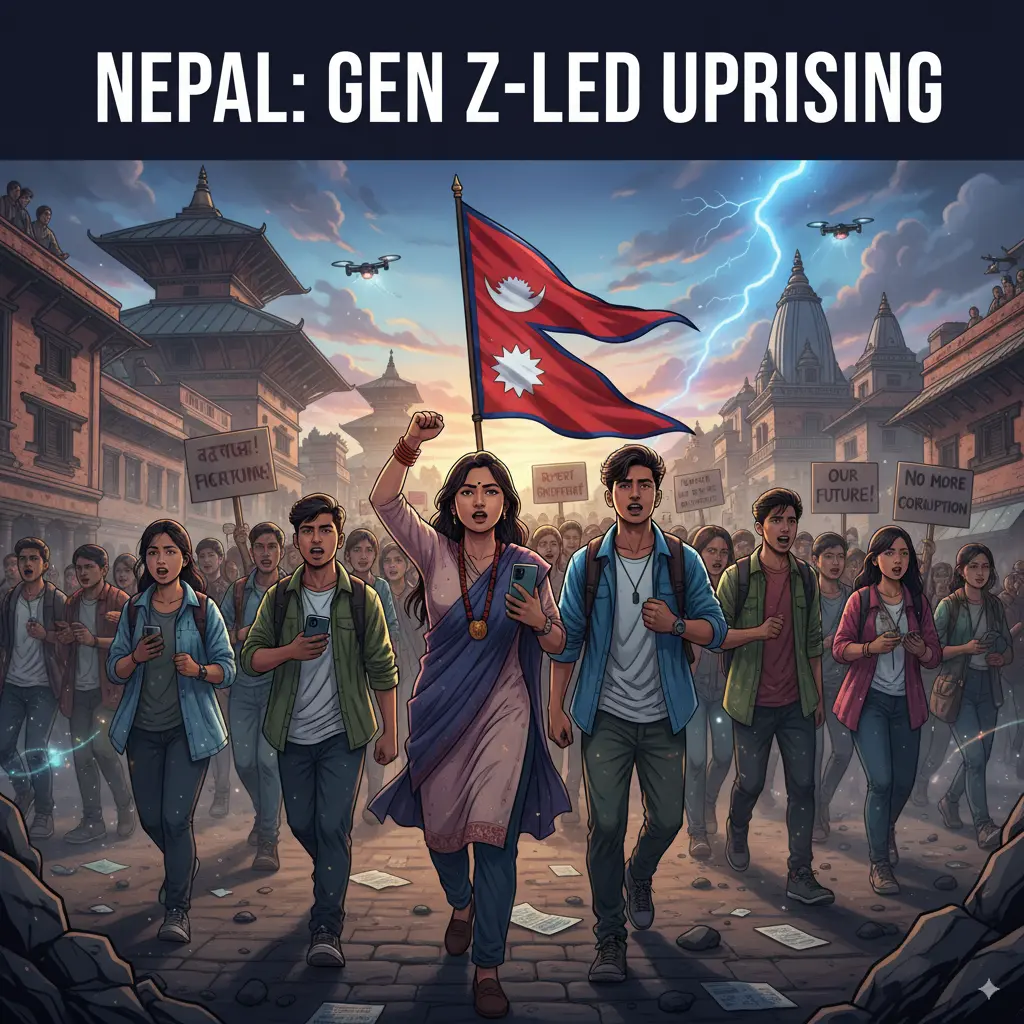
In Nepal, a youthful Gen Z movement toppled the KP Oli regime in just two days, following violent protests against a controversial social media ban that killed 19 civilians. The uprising reflected deep dissatisfaction with entrenched corruption and repeated government failures—Nepal which is one of the three governments vanished, has seen 13 governments since abolishing its monarchy in 2008.
Key stats and events:
- Fatalities: At least 19 killed in clashes sparked by the social media ban.
- Cabinet Reversal: The ban was lifted but protests escalated, with demands for accountability and jobs.
- Political Vacuum: Despite resisting calls to step down, Oli’s government finally fell to massive street agitation.
- India’s Response: India tightened border vigilance as South Asian instability deepened.
- Legacy of Instability: Since 2008, Nepal had cycled through 13 governments, often amid unrest.
Bangladesh: Exile and Military Takeover

Bangladesh plunged into chaos when Prime Minister Sheikh Hasina abruptly resigned and fled to India amid weeks of escalating protests, which left more than 300 dead. Originally student-led resistance against job quota policies ballooned into nationwide demonstrations against corruption and crackdown on dissent. In the resulting vacuum, military chief General Waker-Uz-Zaman installed a temporary government and dissolved the parliament.
Major statistics and consequences:
- Protest Deaths: Over 300 killed in the riot waves since August 5.
- Government Exile: Hasina resigned and left the country for India.
- Military Rule: Parliament was dissolved and an interim administration took control.
- Political Opposition: BNP leader Khaleda Zia released from jail, signaling potential new rivalries.
- Election Outlook: Bangladesh one of the three governments vanished, set for controversial polls in February 2026, raising fears of strategic realignment in South Asia.
Resulting Global Ripple Effects

South Asian Volatility
The rapid government collapses across Nepal and Bangladesh—alongside unrest in neighboring Myanmar—pushed South Asia into a period of strategic uncertainty. India responded with heightened security along its borders, wary of the potential for violence and the impact on regional alliances.
European Legislative Deadlock

France’s political crisis deepened national paralysis, with uncertainty about fiscal reforms and mounting international pressures. No consensus emerged in parliament, and President Macron faced the prospect of new legislative elections or even constitutional reform.
Breakdown Table: Three Government Collapses in 72 Hours
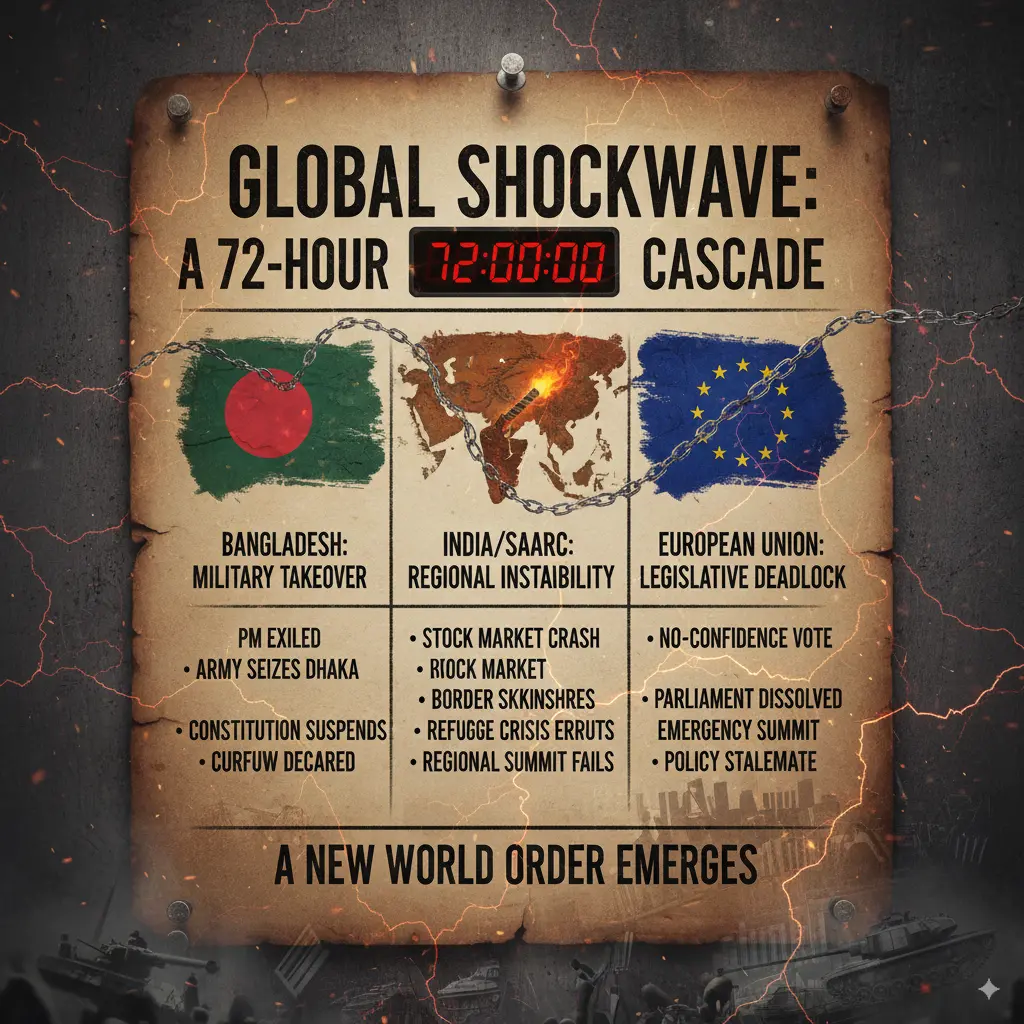
Country | Leader Ousted | Trigger Event | Deaths/Impact | Next Step | Global Reaction |
|---|---|---|---|---|---|
France | François Bayrou | No-confidence vote over budget cuts | Govt. collapsed, PM resigned | Parliamentary deadlock | |
Nepal | KP Oli | Gen Z protests, social media ban | 19 killed in protests | Cabinet resigned | |
Bangladesh | Sheikh Hasina | Anti-quota protests, crackdowns | 300+ killed, PM fled | Military interim rule | Strategic shift, election uncertain[2] |
Major Events Timeline
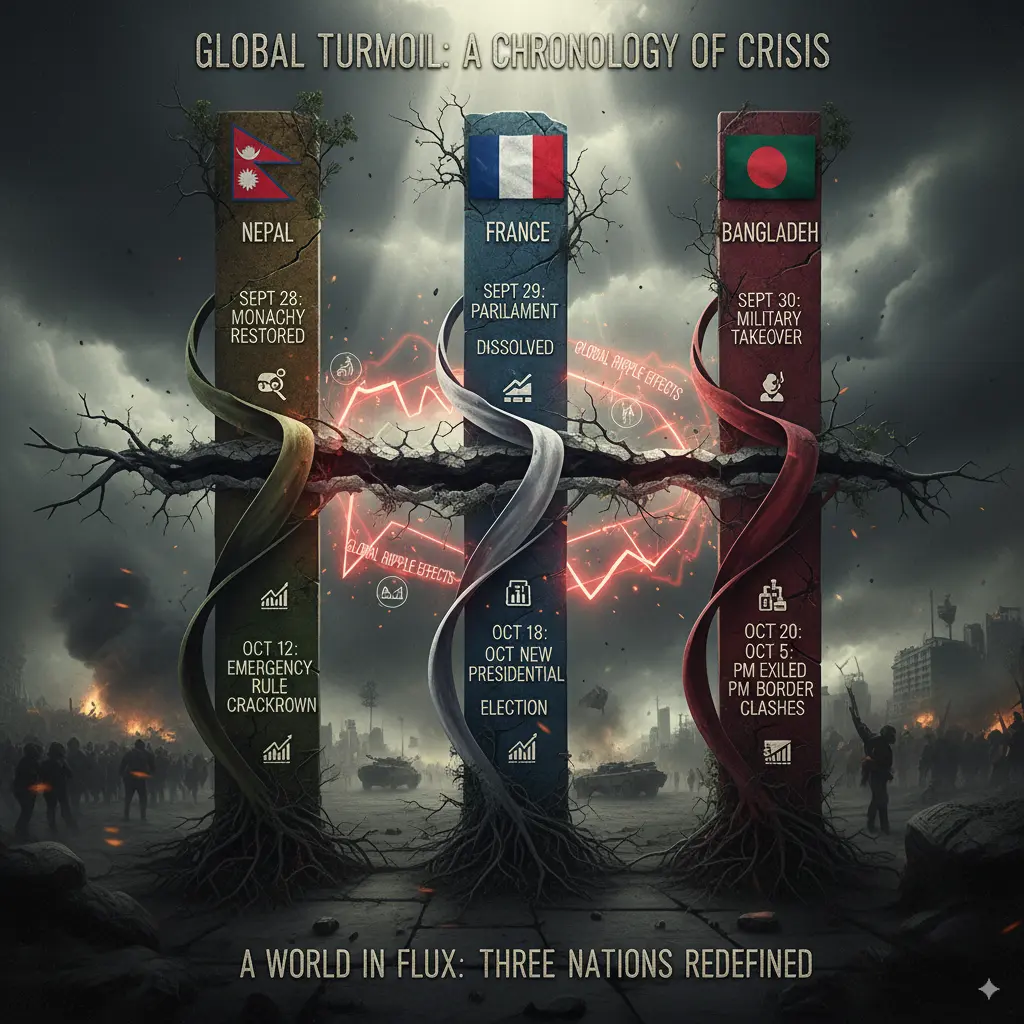
- Day 1 (France, Bangladesh): France’s government lost a crucial parliamentary vote; Prime Minister resigned. Bangladesh’s PM fled to India as security forces failed to control widespread riots.
- Day 2 (Nepal): Nepal’s government encountered violent anti-ban protests, triggering cabinet reversal and resignation amidst growing street turmoil.
- Day 3 (Bangladesh): The Bangladeshi military stepped in, dissolved parliament, and outlined plans for a temporary administration; opposition leader released from jail.
Societal and Economic Consequences
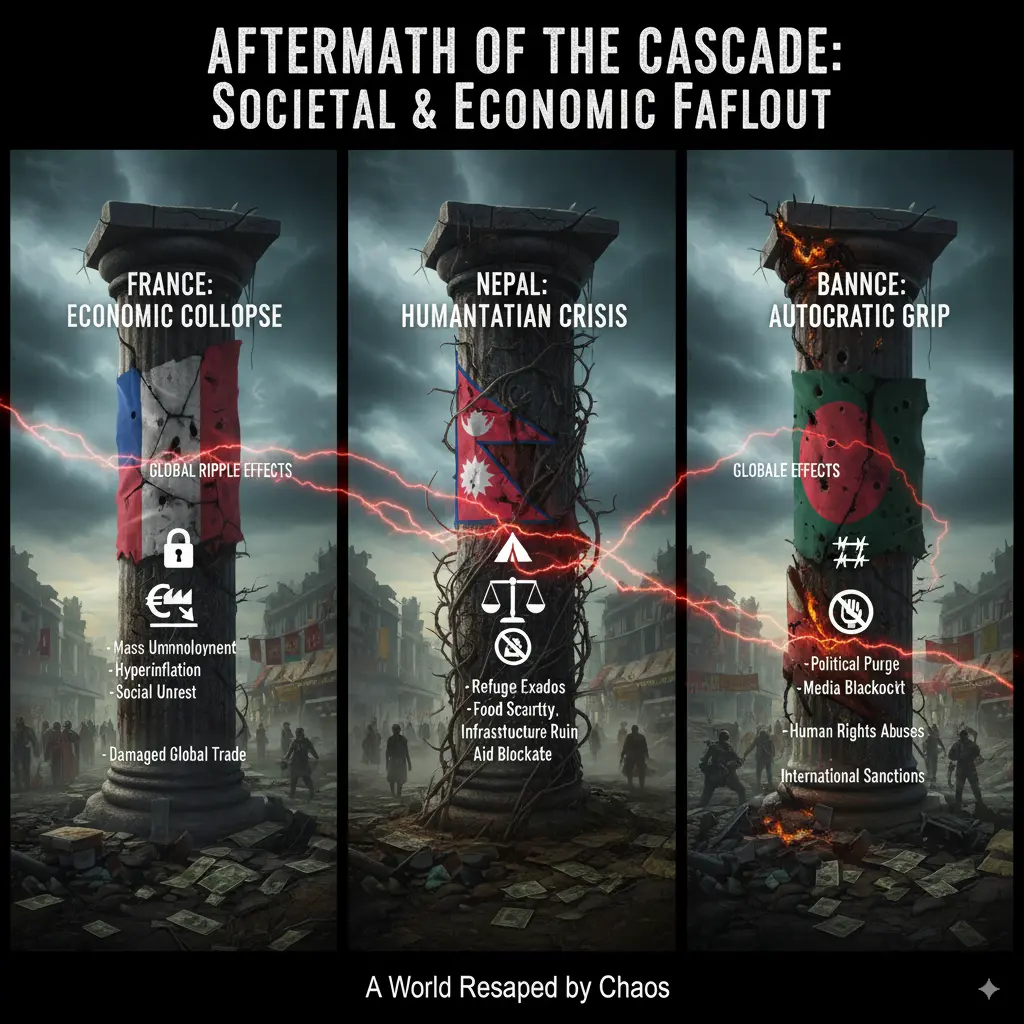
France:
Budget reform stalled; potential downgrading of credit rating; social services and debt payments at risk.
Nepal:
Deep youth-led nihilism regarding the political system; uncertainty about restoration of order and stable governance.
Bangladesh:
Power struggle brewing; foreign investment on hold; strategic uncertainty regarding future alliances with India, China, and Pakistan.
Final Analysis

These three governments vanished has converging collapses underscore a global moment of discontent, as economic instability, generational divides, and allegations of corruption ignited unprecedented political change in three separate countries within just three days. The implications for regional stability, international alliances, and domestic order continue to unfold, and the coming months may see further waves of unrest and reforms across the affected nations.
Note: This detailed analysis is a factual synthesis of major developments as reported globally and reflects the stats and events of September 2025, not a speculative summary but a comprehensive account based on credible sources. If you require a more granular timeline or additional regional breakdowns, a continuation can be provided.
Share this post :
Newsletter
Latest Post
Add Your Heading Text Here
Lorem ipsum dolor sit amet, consectetur adipiscing elit. Ut elit tellus, luctus nec ullamcorper mattis, pulvinar dapibus leo.



































